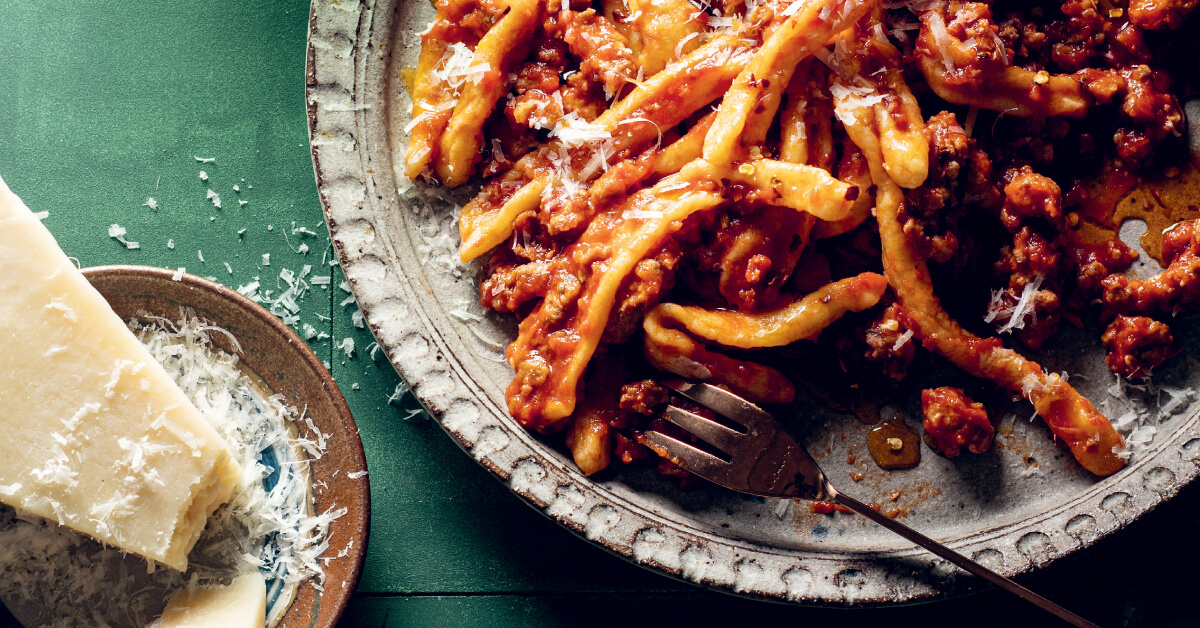Recipe & pairing | Silvia Colloca's (Italian Family Food) Homemade maccheroni with sausage ragù

Ease the stress and add more joy at meal times. Silvia Colloca’s “Italian Family Food” (available now!) is chock full of wisdom and tricks passed down from generations of clever, thrifty nonnas. Delicious Italian home cooking to bring your family together around the table; this mouth-watering maccheroni al ferro con ragù di salsiccia (homemade maccheroni with sausage ragù) sparked our appetites… and got us searching out the wines we’d pair alongside, naturally.
Pairing tip: “Fiano for me. You thought I was going to say nebbiolo (Barolo) or sangiovese (Chianti), didn’t you? They absolutely have a time and a place with this dish - the recipe even suggests a glass - but sometimes a white wine with a tomato-based pasta is what I’m after, especially with a sausage ragu (or porchetta, for that matter). It all comes down to personal preference, and you should never be afraid to zig on a pairing when the world zags, if it’s what you enjoy. By all means reach for a red, but a ripe, round white with some generous acidity will be a great partner for what’s on offer here - and if it’s Italian, all the better.” - Nick
Try this with:
Fiano 2023 – Black Market Deal #49266
A Mofo and staff favourite, King Valley fiano is one of the best expressions of Italy in Australia. These Italian grapes do bloody well on Aussie soil, and more and more producers are catching on. These guys have a head start though, and have got the formula down pat. Mediterranean freshness, with wonderfully sunny citrus - think lime, orange blossom, lemon and fragrant honeysuckle. There’s hints of ripe nectarine, too, and a sprinkle of sweet spice kicking in on the close. Delightful stuff, and senses tingling.
Riecine di Riecine Rosso Toscana IGT 2017
This is very fine sangiovese indeed; a top-notch example of what the grape can do. Grapes from the oldest Riecine vineyards are hand picked and selected, then lightly crushed for a long maceration (20-30 days) in concrete. It is then aged to perfection for 36 months in concrete Nomblot egg tanks. Firm and superbly elegant, with supple tannins and a tongue-tickling backbone of acidity that sees it singing with excitement. All the classical Chianti fruits are here, but beautifully precise and unmuddled. It’s like each individual berry is discernible to taste. Approachable right now, it’ll nevertheless age stylishly for ever more complexity.

Maccheroni al ferro con ragù di salsiccia | Homemade maccheroni with sausage ragù
You definitely don’t need a pasta machine to make fresh pasta from scratch. This pasta is a particularly fitting example, as the only gadget you need is a knitting needle. ‘Ferro’ means needle in Italian, and southern Italian nonnas show exquisite creativity wrapping pasta dough around one, to obtain a hollow shape designed to capture the sauce.
I was first introduced to this recipe by my friend and neighbour Alfia, whose mum, Enna, still rolls maccheroni like a boss in her 90s! We spent a beautiful afternoon in Alfia’s kitchen, gathered with family and friends as the two Sicilian ladies generously shared their knowledge with us. Italian music was playing, traditions were shared, memories were made. A true gift was received, in the shape of rustic handmade pasta.
I was so glad when Alfia agreed to come over and help me roll some for this book. My skills are still a work in progress, but it looks like Alfia has her mum’s agility in her hands!
SERVES 6
INGREDIENTS
MACCHERONI
2 egg yolks
500 g semolina
200–250 ml warm water
RAGÙ
3 tablespoons extra-virgin olive oil
2 garlic cloves, skin on, bashed with the back of a knife
4 pork and fennel sausages, squeezed out of their casings
100 ml red wine (such as Chianti, Sangiovese or Pinot Noir)
1 litre (4 cups) passata
salt flakes and freshly ground black pepper
freshly grated parmigiano, for dusting
To make the maccheroni, combine the egg yolks and flour in a bowl. Starting with 150 ml, slowly pour in the warm water, mixing as you go to create a firm but pliable dough. Knead on a wooden board for 10–12 minutes until smooth and silky. Rest, covered in beeswax wrap, for 30–60 minutes.
Pinch off a 2 cm piece of dough. Flatten to a 7–8 cm length, roll it around a knitting needle and release, then place on a tray. Repeat with the remaining dough. Allow the pasta to dry for 12–14 hours at room temperature. Once dry, use straight away – or keep in the fridge in an airtight container for up to 3 days (or freeze for another day).
To make the ragú, heat the olive oil in a large saucepan over medium heat, add the garlic and cook for 2 minutes or until fragrant. Add the sausage meat and break it up with a fork to brown all over. Deglaze the pan with the wine, scraping up any bits caught on the base, and cook off the alcohol for 2–3 minutes. Tip in the passata, season with salt and pepper, reduce the heat to low and cook for 2 hours or until reduced by one-third. Taste for seasoning and adjust to your liking.
Bring a large saucepan of salted water to the boil, add the pasta and cook for 7–8 minutes until cooked through. Using a slotted spoon, lift the maccheroni from the water and drop them straight into the ragù. Mix well and serve hot with a dusting of parmigiano.
This recipe is an extract from "Italian Family Food" by Silvia Colloca, available now.